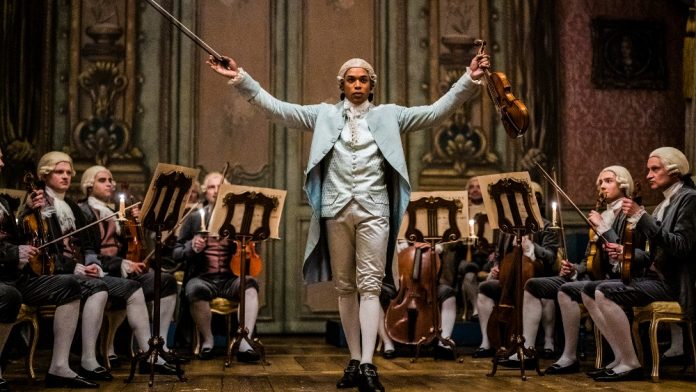Stephen Williams is a veteran TV director who won an Emmy as a producer on HBO’s Watchmen and was also nominated for directing the episode “This Extraordinary Being,” in addition to earning two nominations for his work on Lost.
Despite Williams’ vast experience behind the camera, Chevalier is his first major studio movie, as the period film hails from Searchlight Pictures. Kelvin Harrison Jr. stars as Joseph Bologne, the illegitimate son of a French plantation owner and a Caribbean woman, who as a child is abandoned outside of a musical academy, where he learns to foster his immense gift for playing the violin.
Decades later, Bologne has become the toast of 1700s France and received the title of “Chevalier de Saint-Georges” from no less than Marie Antoinette (Lucy Boynton), but he’s in danger of throwing it all away by having a tryst with a married opera singer (Samara Weaving).
With Chevalier, Williams takes everything he learned making television and applies it to the big screen, and his feature debut benefits from his prior experience and attention to detail, as this period piece transcends the usual clichés of the genre — largely because Joseph/Chevalier is such an interesting historical figure who we just haven’t read or heard much about.
Above the Line spoke with Stephen Williams over Zoom a few weeks back — an interview conducted before our recent chat with star Kelvin Harrison, Jr. — and he talked about working with two composers, doing research with writer Stefani Robinson, and the Tom Stoppard quote that served as their North Star.
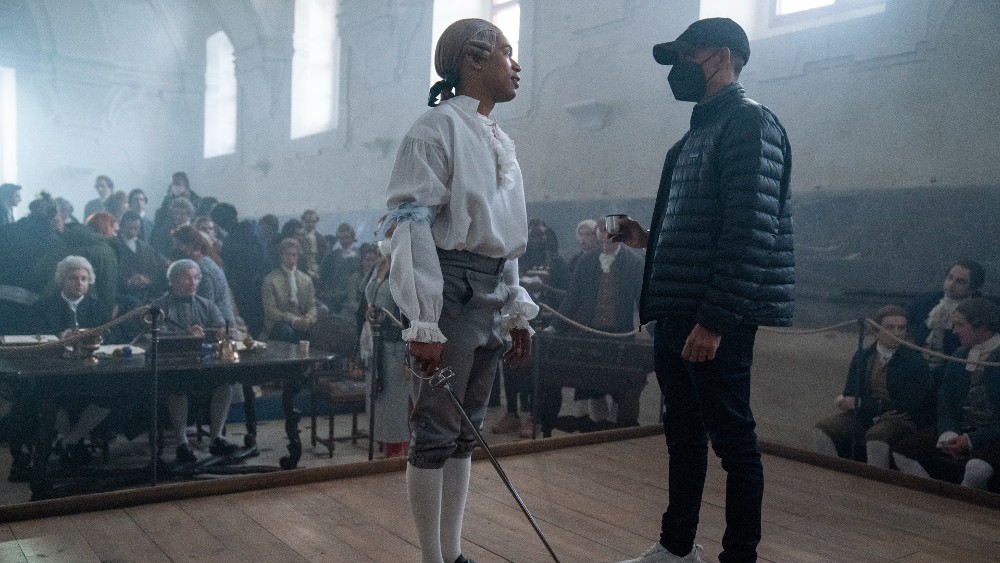
Above the Line: Is Chevalier considered your feature directorial debut? Because I could’ve sworn I saw some movies you did in the ’90s on your IMDB page…
Stephen Williams: I did a bunch of TV movies in the early part of my career, so that’s probably what they’re referring to.
ATL: You’ve done a lot of television since then, so how did this movie find its way to you?
Williams: I got sent the script out of the blue by Searchlight Pictures and literally read the first scene and knew it was something that I had to do. I was astonished that I’d never even heard of Joseph Bologne, aka Chevalier, and I was astonished because he’s such an accomplished person, right? He’s this virtuosic violinist, composer of classical concertos, opera, [a] champion marksman, champion equestrian, champion fencer. [He was] someone the American President John Adams referred to as the most accomplished man in all of Europe, and I’d never heard of this Black man in mid-1700s France.
I immediately fell in love with the script, and then, because I didn’t know anything about Chevalier, prior to encountering the script, I went on a deep dive of research myself. What became really clear was that the social milieu that Joseph was operating in pre-Revolutionary France, in a weird sort of way, felt very contemporary and felt like it had real cultural relevance to the moment that we find ourselves in right now. So that only deepened my resolve to bring this film to the screen and bring the story to the screen.
And then, on a smaller personal level, Joseph Bologne was from the Caribbean, from the island of Guadeloupe, and brought to France at a very early age. I was born on another Caribbean island, Jamaica, and found myself in Europe, also at a roughly comparable age. The more I learned about Joseph’s life, the more I identified with it and recognized challenges, hurdles, obstacles, [and] opportunities that had come his way that also felt familiar to me and that I connected to and with. For all of those reasons, I felt compelled to make this movie.
ATL: Was Kelvin attached fairly early on? I imagine he must have done a lot of training in the various things required of him for the role even before shooting.
Williams: Oh, yeah, for sure. We did a huge casting search. We were obviously familiar with Kelvin’s work from before — movies like Cyrano [and] Waves, which he was excellent in, so we knew he was a solid actor. Once we met him… he comes from a musical family himself, and he had a kind of intuitive, immediate understanding of the interior landscape of the character that he was going to be playing.
Beyond that, there’s just no exotic way to say what I’m about to share with you, which is just that Kelvin brought a level of commitment and focus and discipline and hard work that was just humbling and astonishing to witness six months before we started shooting. He was training six hours a day with violin coaches so that he could portray the virtuosity of the violin bowing that was a hallmark of Joseph Bologne’s style of playing.
Consequently, when you watch the movie, there’s not a single stunt double shot. There was no stunt double, there’s no cinematic trickery. I photographed the movie in extremely long takes with Kelvin being the person on camera playing that violin. That’s just a testimony to the amount of incredible commitment and hard work that he brought to this role.
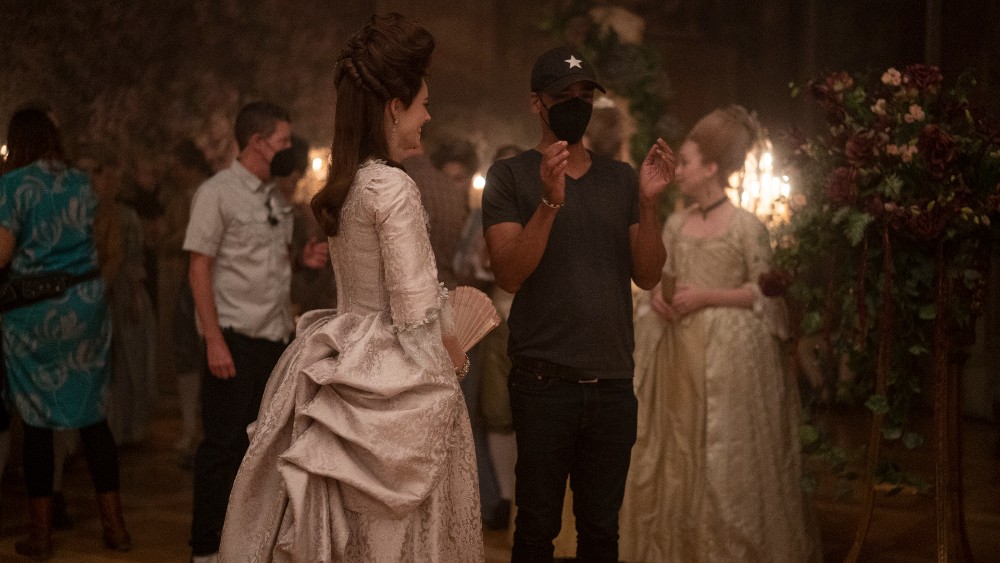
ATL: Kelvin did mention this when I spoke to him at an event for Cyrano, but when I interviewed Michael Abels for Nope, he also mentioned Chevalier, which just got me more interested in seeing it. Michael has a really interesting credit on the film because he’s not composing as much as working with the arrangements and performances. How did he get involved?
Williams: We were blessed to have two amazing composers on our movie. Michael Abels, who folks may be familiar with from scoring movies like Get Out and Us and Nope — all of Jordan Peele‘s movies — and Kris Bowers, who is known for his work on Green Book and King Richard. The way we divvied up the work was, Michael was responsible for all the on-camera performance pieces that Kelvin does in the movie, and Kris was responsible for the underscore.
We tried to use as much of Chevalier’s actual compositions in the movie as we possibly could. In some cases, either Abels or Bowers would take phrases or fragments of Joseph’s compositions and expand on them and write in the idiom of Joseph Bologne’s voice, if you will. In other cases, we just transposed actual entire concertos, so there’s a lot of Chevalier music in our movie.
ATL: It must be difficult to research something like this. Even someone like Shakespeare, who so much has been written about, it was just so long ago that you have to go by word of mouth. How do you research someone like Joseph, who there was far less written about, and go about finding this music?
Williams: We had to do a lot of research, and you’re quite right. The research task was really tricky because there just isn’t that much written about him, first and foremost. Secondly, he left no diaries, journals, or letters. One thing that Stefani Robinson, the writer of the piece, and I, were completely united on was that we were not necessarily interested in doing a cradle-to-grave biopic, which, by the way, given the breadth of Joseph Bologne’s exploits, would have been almost impossible to shoehorn into a single movie anyway. We were interested in making a ‘not-quite-biopic.’
We weren’t interested in making a Wikipedia page. That’s why Wikipedia exists, and [you] can avail yourself of its largess on your own time. We were interested in making a movie that was reflective of the true essence of this portion of Joseph Bologne’s transformative life. We held as our North Star, if you will, in terms of our approach, that famous quote from Tom Stoppard — ‘Facts are facts, but the truth is something else entirely and is a product of the imagination.” That was our mantra, if you will.
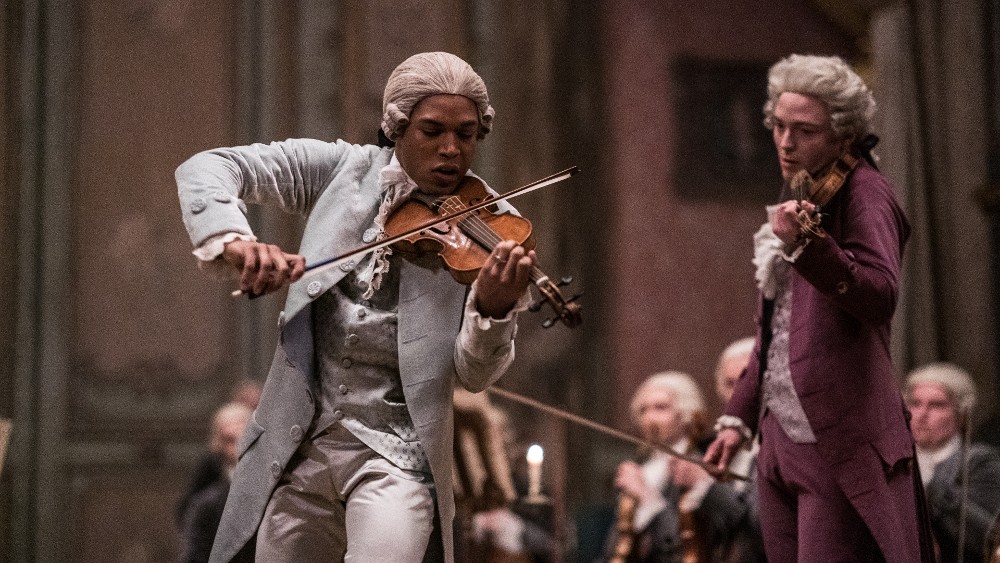
ATL: The opening scene with him having a violin duel with Mozart is a pretty amazing way to start a film, whether it happened or not. Where did you find places to pass off as 1700s France though? I saw you had Oscar-nominated production designer Karen Murphy working with you, and she did a great job turning Australia into Memphis and Vegas for Elvis…
Williams: Karen Murphy is just an unbelievably talented [and] gifted production designer. As you said, she was nominated [as the] production designer on Elvis, along with Catherine Martin, and she designed movies like Queen & Slim and a number of Baz Luhrmann movies. She tirelessly… nobody was on this movie for a paycheck — everybody was consumed by a sense of mission to bring Joseph Bologne’s story to life.
Karen went to the Czech Republic, and she traversed the entirety of that country — North, South, East, and West — and meticulously went over every single location in an effort to find the exact right places that would help us tell our story. The vast majority of the movie’s locations [were found] across the Czech Republic — Joseph Bologne’s apartment is something that Karen designed and built, but pretty much everything else is a location that she found and augmented or altered and shaped to suit our film.
ATL: I’ve been to Prague and I’m seeing more and more movies being made there, and I’m quite shocked by the variety of locations that the Czech Republic offers.
Williams: It’s an amazing country and a great place to work.
ATL: Do you still have to do a lot of visual effects to get rid of the Starbucks populating the city and stuff like that? I guess that’s pretty normal at this point…
Williams: For our movie, there are probably 400 visual effects in the film, which is surprising for a piece like this, but yeah, [the] addition of extras, background performers, removal of aspects of modernity from the frame that were obviously inappropriate, and help with transitions from one scene to the other, and so on. But yeah, that combination of visual effects and Karen’s production design helped us immeasurably.
ATL: You really put together a great team. I wasn’t really familiar with Oliver Garcia’s work as a costume designer, but everyone did such a good job creating these looks that when I saw this at TIFF, I didn’t even recognize Samara Weaving or Marton Czokas. It was all about the wigs and the makeup and the costumes…
Williams: We were really fortunate to put together a [great] crew both behind and in front of the camera. Our cast is amazing, as you said — Kelvin Harrison Jr., Minnie Driver. Lucy Boynton plays Marie Antoinette. Samara Weaving plays Marie Josephine [and] Marton Czokas plays [her] husband. Ronke Adekoluejo plays [Joseph’s] mom. [It’s] just an amazing cast, top to bottom.
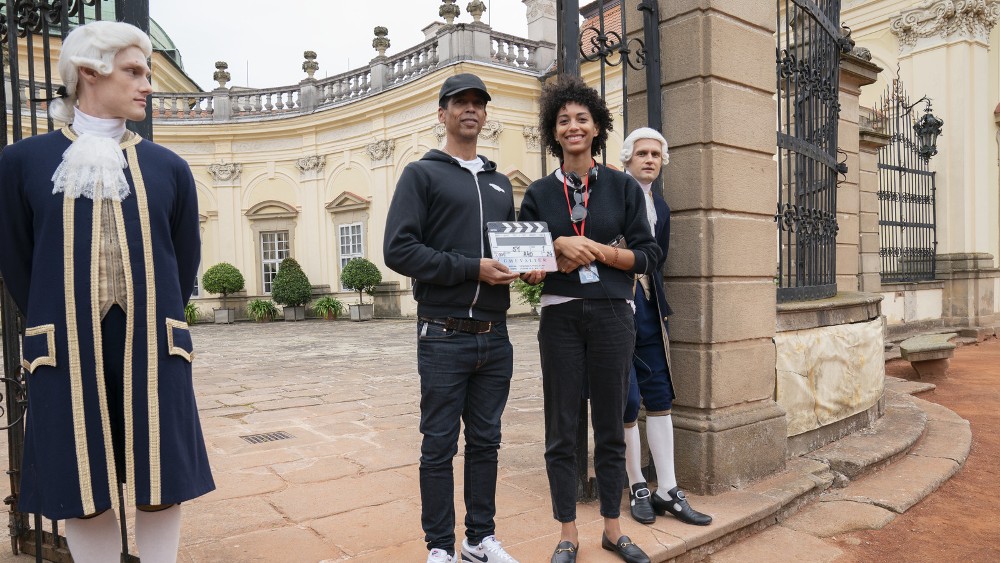
ATL: There have a lot of films set during this time period, but this one seems to strive for greater authenticity than some of the others, so was there something that Karen and Oliver used for reference, in terms of the costumes and locations, that kind of unlocked everything for you?
Williams: As I said earlier, we recognized that there were echoes in Joseph’s story and the social milieu that he was living in that reminded us all of so much that was happening in our contemporary world. So for us, we felt like [if you get rid of] the wigs and the costumes, this story could be happening today. That was our clue, in terms of a tonal approach to the movie, and what we tried to do from production design through all of our costume design was to balance keeping one foot in honoring the time period in which the events of the story unfold, but also acknowledging the contemporary vibe of the whole piece.
We wanted viewers to not experience that sense of distance that one often gets with Masterpiece Theater‘s treatment of period pieces. We wanted it to feel urgent and present and subjectively immediate, if you will. A lot of our efforts and energy were about… for Joseph Bologne and all of his temporal contemporaries, the experiences in the movie were not something that they saw through a periscope 200 years removed. They were living in the now. That music was being performed in the now. People were reacting and responding in the now, and we wanted to do whatever we could to try and impart that sense of immediacy to the viewing experience.
ATL: You obviously did a lot of TV before making your first major studio movie — and in the middle of COVID, no less. How are you feeling about what you want to do next? Do you like the variety of TV and being able to work on a show for a week or two? What’s the general appeal of directing TV versus movies?
Williams: As a general rule, I end up producing a lot of the TV stuff that I do anyway, so for me, it’s not like being a journeyman — in for a couple of weeks and then out. I’m normally in for the long haul.
But I very much enjoy the canvas of being able to tell a singular story over the travel of a feature film, but I also enjoy doing TV as well. It really just depends on the story and the world and the characters, the plot, all of that. It just depends on… case by case, [I’d say].
Chevalier is now available to buy or rent on all major VOD/digital platforms. Click here to read our interview with Kelvin Harrison Jr.


